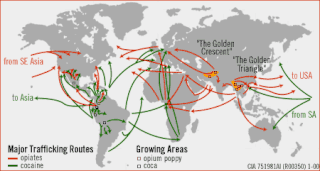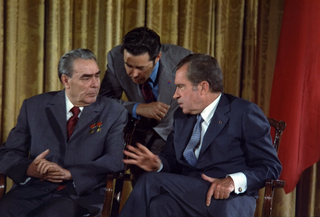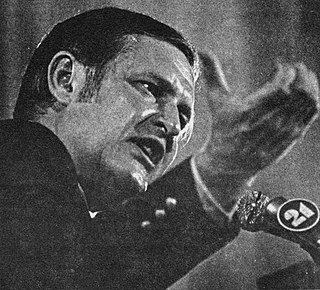Related Research Articles

The illegal drug trade or drug trafficking is a global black market dedicated to the cultivation, manufacture, distribution and sale of prohibited drugs. Most jurisdictions prohibit trade, except under license, of many types of drugs through the use of drug prohibition laws. The think tank Global Financial Integrity's Transnational Crime and the Developing World report estimates the size of the global illicit drug market between US$426 and US$652 billion in 2014 alone. With a world GDP of US$78 trillion in the same year, the illegal drug trade may be estimated as nearly 1% of total global trade. Consumption of illegal drugs is widespread globally, and it remains very difficult for local authorities to reduce the rates of drug consumption.

Détente is the relaxation of strained relations, especially political ones, through verbal communication. The diplomacy term originates from around 1912, when France and Germany tried unsuccessfully to reduce tensions.

José María Hipólito Figueres Ferrer served as President of Costa Rica on three occasions: 1948–1949, 1953–1958 and 1970–1974. During his first term in office he abolished the country's army, nationalized its banking sector, and granted women and Afro-Costa Ricans the right to vote, as well as access to Costa Rican nationality to people of African descent.
Robert Lee Vesco was an American criminal financier. After several years of risky investments and dubious credit dealings, Vesco was alleged to have committed securities fraud. He immediately fled the ensuing U.S. Securities and Exchange Commission investigation by living in a number of Central American and Caribbean countries.

Jack Northman Anderson was an American newspaper columnist, syndicated by United Features Syndicate, considered one of the founders of modern investigative journalism. Anderson won the 1972 Pulitzer Prize for National Reporting for his investigation on secret U.S. policy decision-making between the United States and Pakistan during the Indo-Pakistani War of 1971. In addition to his newspaper career, Anderson also had a national radio show on the Mutual Broadcasting System, acted as Washington bureau chief of Parade magazine, and was a commentator on ABC-TV's Good Morning America for nine years.

The United States Central Intelligence Agency (CIA) has been accused of involvement in drug trafficking. Books and investigations on the subject that have received general notice include works by the historian Alfred McCoy, professor and diplomat Peter Dale Scott, journalists Gary Webb and Alexander Cockburn, and writer Larry Collins. These claims have led to investigations by the United States government, including hearings and reports by the United States House of Representatives, Senate, Department of Justice, and the CIA's Inspector General.

Francis Donald Nixon was a younger brother of U.S. President Richard Nixon.

David Hilliard is a former member of the Black Panther Party, having served as Chief of Staff. He became a visiting instructor at the University of New Mexico in 2006. He also is the founder of the Dr. Huey P. Newton foundation.

Rafael Caro Quintero is a Mexican drug lord who co-founded the now-disintegrated Guadalajara Cartel with Miguel Ángel Félix Gallardo and other drug traffickers in the late 1970s. He is the brother of fellow drug trafficker Miguel Caro Quintero, founder and former leader of the defunct Sonora Cartel.

Various American fugitives in Cuba have found political asylum in Cuba after participating in militant activities in the Black power movement or the Independence movement in Puerto Rico. Other fugitives in Cuba include defected CIA agents and others. The Cuban government formed formal ties with the Black Panther Party in the 1960s, and many fugitive Black Panthers would find political asylum in Cuba, but after their activism was seen being repressed in Cuba many became disillusioned. House Concurrent Resolution 254, passed in 1998, put the number at 90. One estimate, c. 2000, put the number at approximately 100.
John H. Meier is an American financier and business consultant now living in Vancouver, Canada. He is noted for playing a key role in a controversial mine acquisition project for Howard Hughes and for his behind-the-scenes involvement in events that precipitated President Richard M. Nixon's resignation.
Trixolan (TX) is a purportedly therapeutic agent based on Viroxan, a citronella-based substance used by Stephen Herman, a Californian doctor who used it to treat AIDS patients. State medical officials stated that the drug hastened the deaths of at least two AIDS patients. Herman surrendered his medical license in 1991 when prosecutors agreed they would, in return, drop civil charges of gross negligence, incompetence, dishonesty and other offenses. In 1994, in the first AIDS medical fraud case to come to trial in the United States, a Los Angeles County jury ordered two doctors and a hospital that used Viroxan to pay five patients a total of $2.7 million. Herman had been dropped from the suit when he declared bankruptcy.

Robert Charles O'Brien Jr. is an American attorney who served as the twenty-seventh United States national security advisor from 2019 to 2021. He was the fourth and final person to hold the position during the presidency of Donald Trump.
A drug lord, drug baron, kingpin, lord of drugs, or narcotrafficker is a type of crime boss, who is in charge of a drug-trafficking network, organization, or enterprise.
International Controls Corporation (ICC) was an American holding company incorporated in 1965. Before being taken private in 1997, its subsidiaries included Checker Motors Corporation and Great Dane Trailers. It had previously been forced to liquidate many of its holdings after charges of massive securities fraud against the company's founder, fugitive financier Robert Vesco.
Illegal drug trade in Venezuela is the practice of illegal drug trading in Venezuela. Venezuela has been a path to the United States for cocaine originating in Colombia, through Central America and Mexico and Caribbean countries such as Haiti, the Dominican Republic, and Puerto Rico. In the 2010s, Venezuela also gradually became a major producer of cocaine.

The following events occurred in May 1973:
The Cartel of the Suns is a Venezuelan organization supposedly headed by high-ranking members of the Armed Forces of Venezuela who are involved in international drug trade. According to Héctor Landaeta, journalist and author of Chavismo, Narco-trafficking and the Military, the phenomenon began when Colombian drugs began to enter into Venezuela from corrupt border units and the "rot moved its way up the ranks."
Frank Edward Terpil was a CIA agent born in Brooklyn, New York, U.S. in 1939, who was asked to leave the agency for misconduct in 1971. He then "went rogue", going to work for Edwin P. Wilson's operations supplying arms, bomb making training, and surveillance equipment to numerous regimes.

The cocaine boom was a stark increase in the illegal production and trade of the drug cocaine that first began in the mid to late 1970s before then peaking during the 1980s. The boom was the result of organized smugglers who imported cocaine from Latin America to the United States, and a rising demand in cocaine due to cultural trends in the United States. Smuggling rings of Cuban exiles organized trade networks from Latin America to Miami that streamlined the import of cocaine to the United States. Americans also began favoring less of the drugs popular in the 60s counterculture such as marijuana and LSD, and instead began to prefer cocaine due to a mystique of prestige that was developing around it. This increase in cocaine trade fueled the rise of the crack epidemic and government sponsored anti-drug campaigns.
References
- ↑ Sarah Klein, "Cuba Detains Nixon's Nephew Over Vesco Ties : Interview: Donald Nixon of Tustin says officials have accused him of being involved in the drug trade with the fugitive financier." Los Angeles Times , June 26, 1995.
- ↑ Sarah Klein, "Nixon's Nephew Explains Visit to Vesco in Cuba : Venture: Donald Nixon Jr. says that before his house arrest he was working through the fugitive financier on a 'miracle drug' to treat AIDS." Los Angeles Times , July 6, 1995.